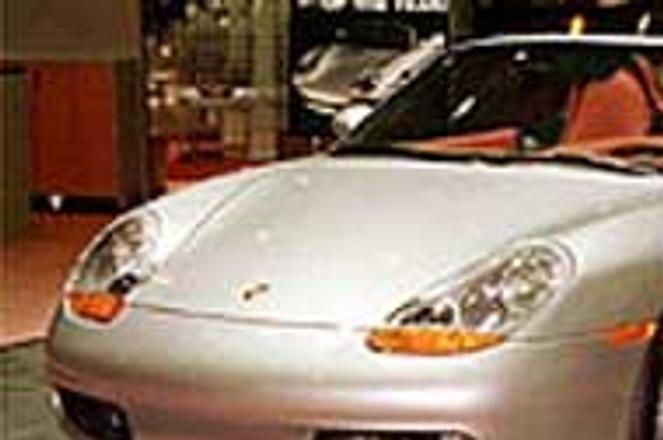Porsche models are a harder sell than ever in Slovakia after the government decided they could not be written off.photo:TASR
Importers of foreign cars are struggling to survive in the tough Slovak market. Thanks to a domestic currency that is 20% weaker than it was less than a year ago, as well as to a government imposed 7% import surcharge as of June 1, sales are down 60% from last year, car importers say.
Július Šabo, general director of the German car importer Mercedes-Benz Bratislava, said that 1999 had been the most trying year in Slovakia for his firm so far.
"This year has been very hard," he said. "The Deutsche mark has strengthened [from 21.65 to the crown on December 17 to as high as 24.18 on May 20] and now there is a 7% import tax. It is hard to say which of these factors hurts us the most, but altogether, we expect to sell only 70% of the passenger cars we sold last year."
And yet, as frustrating as obstacles like devaluation and customs duties are to firms like Mercedes, Renault and Mazda, they are not nearly as demoralising as Slovak government regulations that do great harm and appear to be ill-considered.
Foreign car importers cite as evidence of government hindrance a law which went into effect on January 1, 1999 at the behest of the Finance Ministry. The law states that cars with sticker prices over 450,000 Slovak crowns ($10,750) may not be written off by corporate buyers as a business expense.
According to Finance Ministry spokesman Peter Švec, the state was losing upwards of 2.5 billion crowns ($60 million) in taxes per year before the law was passed because businessmen were buying expensive foreign cars for their friends and family and then writing them off as business expenses at tax time.
In order to plug the loophole, he said, the ministry decided that a normal businessman could make do with a car that cost less than 450,000 crowns. "If they want to buy a more expensive car," Švec explained, "they can - but they won't get a deduction."
"The law is not reasonable. It's crazy," said Šabo of Mercedes-Benz. "This law is not acceptable in other countries. They tried it in Austria and Belgium but it didn't work. We recommended different taxes and other options, but they did not listen to us."
"This is a Bolshevik law," agreed Horst Vilček, director of Volvo dealer Top Auto Bratislava. "This is an anti-business law and it is illegal. If Mrs. Schmögnerová had given this more thought, she would have come up with a better law than this. This law is just wrong."
Švec, however, said that the law had actually been "inspired" by previous, similar laws in the West, and added that it could have been even harsher. "In countries like Great Britain, for example, laws are still stricter than they are here," he said.
Švec acknowledged that the law had had other objectives than "raising the tax discipline of the average Slovak businessman." Cutting foreign imports, he said, would help Slovakia's trade balance deficit, which has been around 10% of GDP for three years and is considered one of the greatest threats to the economy.
But car importers say the law has served only to restrict further a market that didn't have a large group of prospective clients in the first place. "Someone said that there are a lot of rich people in Slovakia, but it's not true," Šabo said. "Mercedes sells up to 450,000 cars a year in Germany for a 10% share. But in Slovakia, Audi, BMW, Volvo and Mercedes combined sell around 1,000 of the 70,000 cars sold per year."
Other importers say the law has given an unfair advantage to domestic car maker Škoda, almost all of whose models retail under 450,000 crowns. "Every car company is complaining, except Škoda and other cheap car producers, " Volvo's Vilček added. "The government is only trying to appeal to the poor people by pretending that they are doing something against the rich privatisers."
Disturbing trend
For car importers who have been doing business in Slovakia for a long time, the country's swiftly changing economic laws - and thus business environment - are nothing new.
"The current government is doing exactly what the previous government did," said Peter Kramár, director of Porsche Slovakia. "They are enacting laws without discussing them with the businesses which will be directly affected."
Kramár said that the January tax law could have been scripted according to a law standard in Europe, in which the expenses allowed businessmen for car purchases depend on what kind of business is involved. Top bankers, he said, who must represent their firms, are given more leeway in car purchases than owners of newspaper kiosks.
"Laws like this have a drastic impact on the market, which used to function quite well,". "They also tend to divide importers into two groups - Škoda, which is profiting, and car importers which are having problems selling their products."


